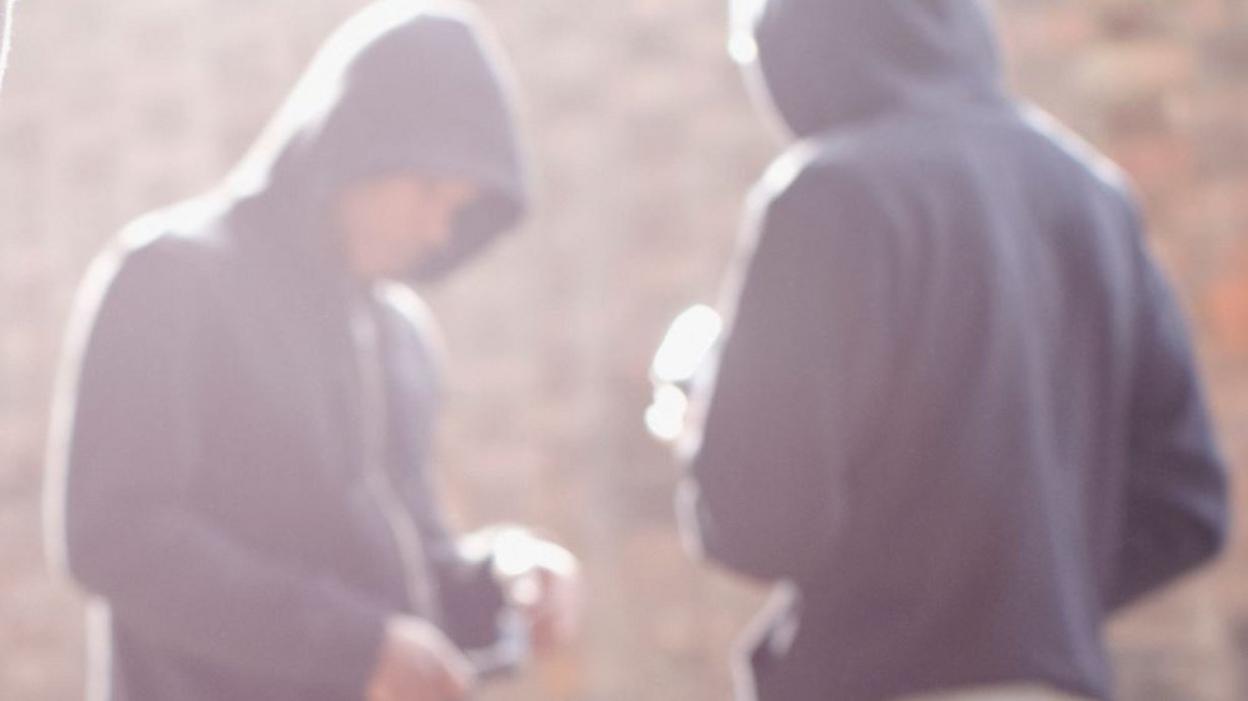Covid: Youth clubs fear for children 'lost to the streets' in pandemic
- Published
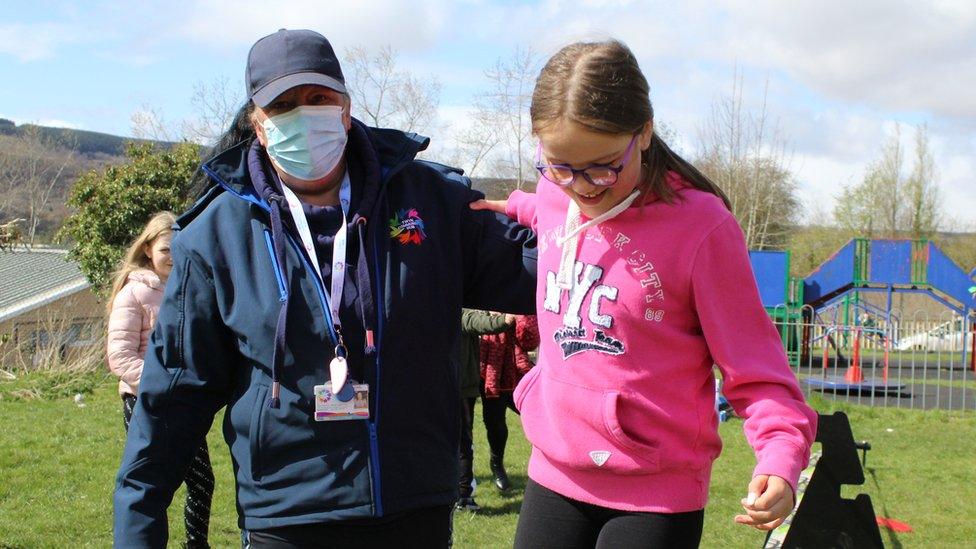
Youth workers say children have been excited to see each other at clubs again
There are fears children as young as 11 have been "lost to the streets" as some youth clubs remain closed due to Covid restrictions.
Youth workers said some had fallen into gangs, were struggling with mental health, or had begun using drugs and drinking.
They say they fear more could suffer unless changes are made to Covid rules to allow teenagers back into clubs.
The Welsh government said it had worked with the sector through the pandemic.
In Merthyr Tydfil, youth worker Paula Mahoney said repeated lockdowns had forced many children to "grow up too quickly".
"I've witnessed them sitting in the field across from us doing drugs at 15 - I would have never have dreamt it," she said.
Other youth workers said they were trying to re-engage teenagers but Covid restrictions stopped clubs giving them a safe place to go.
Young people said clubs had been a vital lifeline during the pandemic but they feared some friends had become isolated and might not return.
'We need to bring them back in'
Last spring clubs were closed due to lockdown restrictions.
Children in England have been able to meet indoors at clubs since May, with no limits on numbers or having to stay in school groups, external, but with over-18s having to abide by stricter rules.
In Wales, while youth clubs can now reopen, children over 11 still have to socially distance, with numbers indoors limited depending on venue size, external.
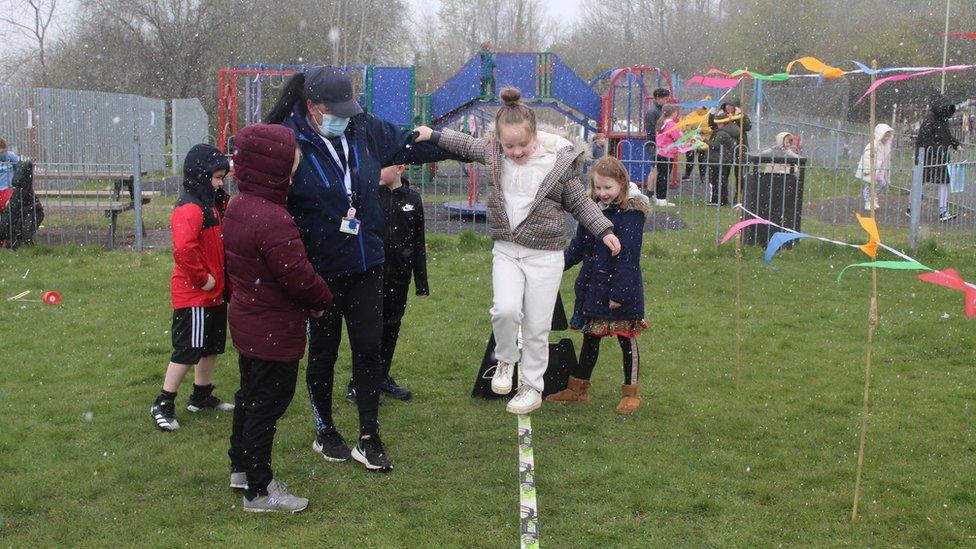
Youth workers were able to put on outdoor sessions in between lockdowns
Before lockdown 30 to 40 children and teenagers would head to Twyn Community Hub in Merthyr Tydfil every week.
Ms Mahoney said the club - which helps seven to 25-year-olds - had put on virtual events and sent out activity packs, but she feared many members had been "lost to the streets".
She said before lockdown children as young as 11 had spoken to her about self harm, and while she had checked on them, being unable to talk face to face had been frightening.
Ms Mahoney said she feared many would end up in trouble unless funding was increased to allow her to do outreach work.
She said she worried that while some were hanging around in areas frequented by drug dealers and had fallen in with gangs, others were alone and isolated.
"We have the holidays coming soon, it's going to be chaos," she said.
"The biggest worry is now the children, who would normally be at the club, who are on the streets, getting involved in all sorts - fighting, gangs - we need to either find a way to bring them back in or rebuild relationships."

'There wasn't anything to do'
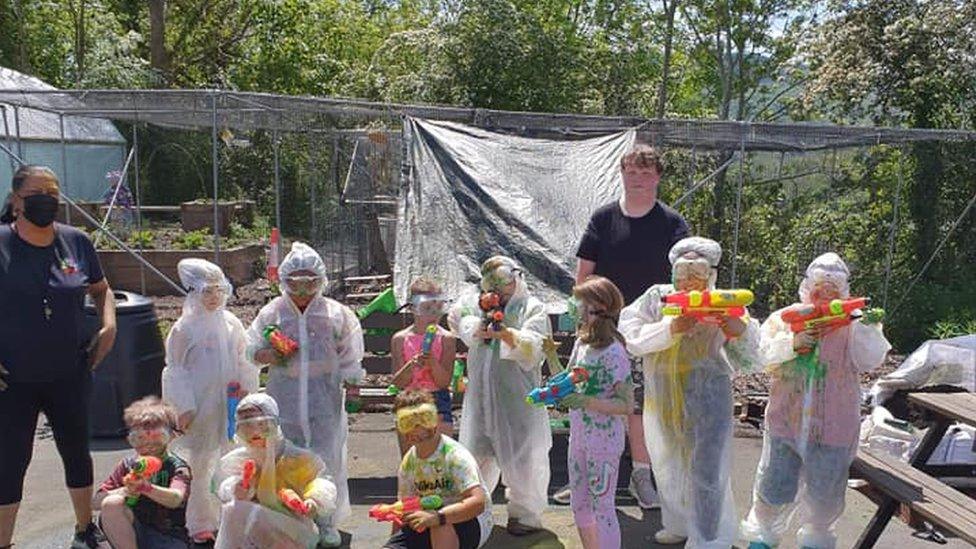
Bailey has been helping put on activities for the younger club members, including water and paint fights
Bailey started going to the club when he was about 12 to hang out with friends, but then Covid hit.
"All I did was sit at home and watch telly, there wasn't anything to do," he said.
Now volunteering at the centre every day, the 15-year-old is growing food in the garden and helping with the younger children.
"Before I became a volunteer I was a very shy person... hopefully now I would say I was the up-and-go person in the room," he said.
'We've been put 10 years back'
Before lockdown young people at the Sydic youth club talked about the group being one big family.
Before lockdown, young people attending Senghenydd Youth Drop-In Centre (Sydic) in Caerphilly county said it was like spending time with family.
Now Dave Brenton, who runs the not-for-profit club, said repeated lockdowns had put the club's work back "about 10 years".
"We have had mental health issues during the pandemic... some parents are saying they won't come out of the house... there's two sides of it, some will never go home and others won't come out of the house," he said.
"To us, two years is a disruption. To a kid, it's a lifetime."
Mr Brenton said many youngsters had tried hard to stick to rules, but it was understandable they wanted to get out and see their friends.
He said while the club was doing everything it could, the rules made it "impossible" to put on indoor sessions, despite the children socialising together in school.
"We were a family and we have to rebuild that somehow, we've got to build those relationships back up again," he said.
"I don't think we are going to get some of them back, and that's a tragedy, because they are going to be lost to drugs and crime and all sorts of things.
Youth worker Ali said while young people had always hung out on the streets, they used to "check in" when they popped in to socialise, get food and have a chat.
"We just lost that contact... they're still out there, but we're not, so we're not there to guide them in any way," said Ali, who hoped many would come back.
Christine Edwards, a youth worker at the club, said some had found the restrictions "extremely hard" and had become isolated staying home while their friends continued to go out.
"They've been robbed of so much," she said. "They are always asking when Sydic is going to open, they cannot wait for that centre to reopen."
'Frustrating and lonely'
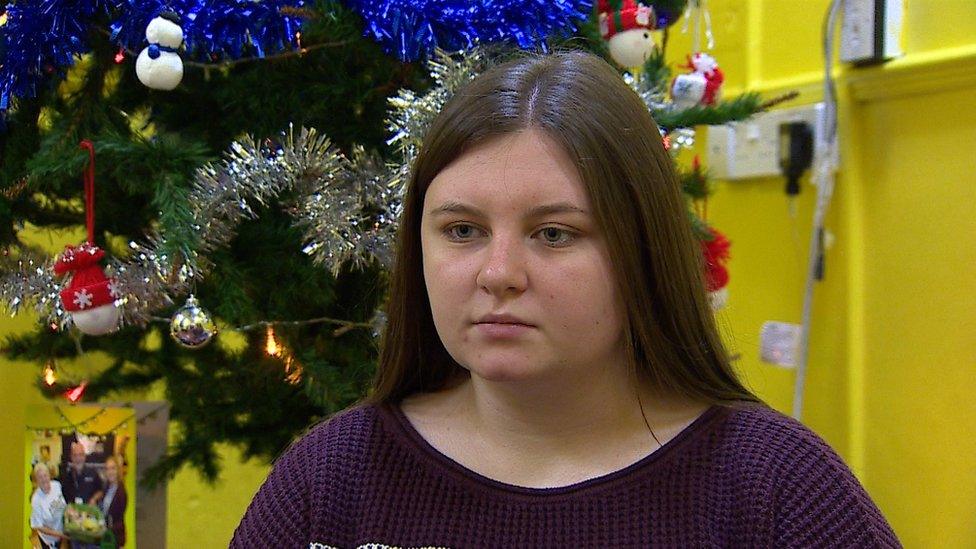
Before the pandemic Esme-Jade spoke to BBC Wales about the importance of the club - and now says it is vital young people come back
While video sessions have been put on, volunteers said many had not attended due to poor wi-fi or not feeling confident putting their cameras on.
Esme-Jade, 19, a student who volunteers at the club, said she worried some members would not return and would remain isolated from friends.
"We left school with no closure, and then everything came to a close, it was quite a worrying time," she said.
After the club helped him to gain confidence, 18-year-old William said lockdown had been a "weird time" and holding video sessions had helped to keep connected.
"Even if I was getting a bit lonely stuck in the house, I had someone to talk to," he said.
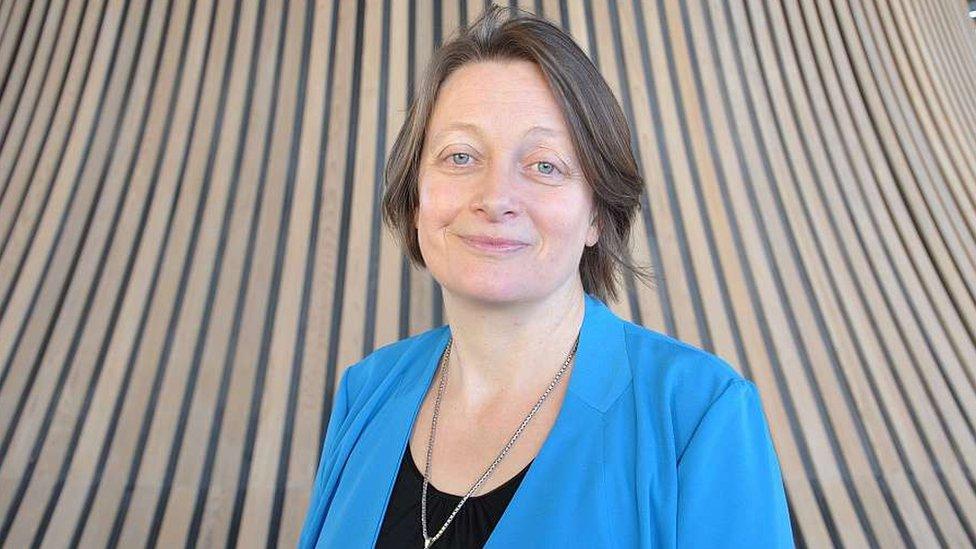
Sally Holland says youth services are a "first line of defence" against serious issues like knife crime and drugs
A recent report, external shows that in Cardiff alone numbers of young people experiencing emotional and mental health issues have risen "significantly" since schools reopened after the Christmas lockdown.
Council officials said the number of children on the child protection register increased, external from 253 to 458 - a rise of of 81% - in the past 12 months.
The council is planning to put on extra club nights this summer, in a bid to re-engage young people after the pandemic.
Children's Commissioner Sally Holland said while youth workers in Wales had worked hard to keep youngsters safe, they had faced "immense challenges" during the pandemic.
"It's worrying to hear youth workers talking about losing touch with young people during the pandemic, and their fears about not being able to provide that support," she said.
"It's important that the government listens to these concerns as we move forward so that their long-term response to the impact of the pandemic can be as effective as possible."
The Welsh government said it had worked with the youth sector throughout the pandemic, and had helped services to access over £21m in grants, with additional emergency funding, to allow them flexibility to respond to "the immediate needs of the young people they support".
- Published27 May 2021
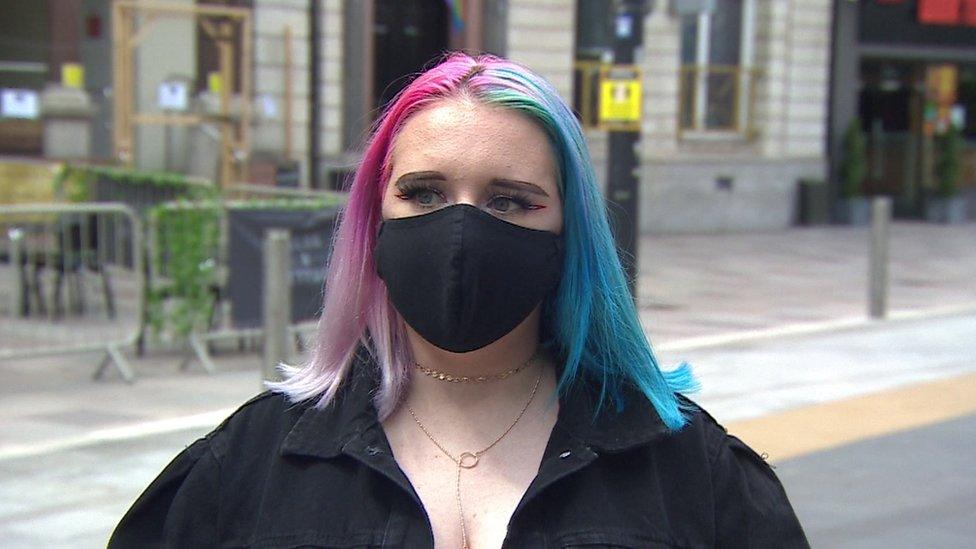
- Published25 November 2019
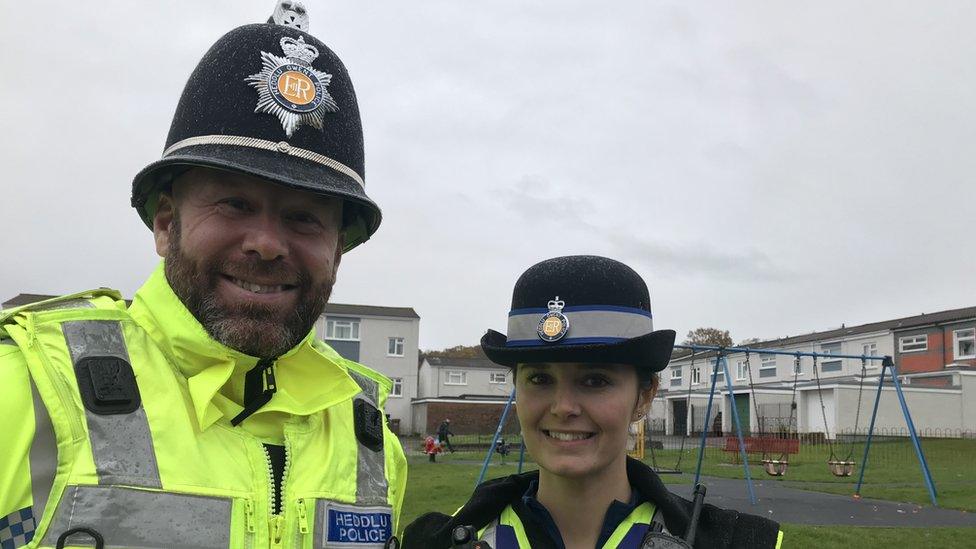
- Published22 December 2019
